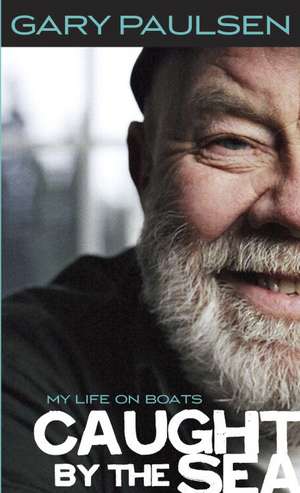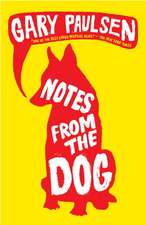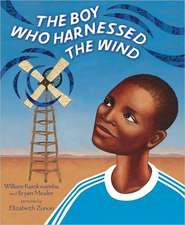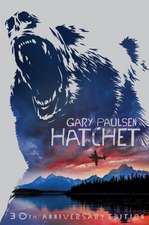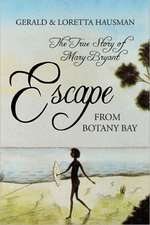Caught by the Sea: My Life on Boats
Autor Gary Paulsenen Limba Engleză Paperback – 31 aug 2003 – vârsta de la 12 ani
But what?
Gary Paulsen takes readers along on his maiden voyage, proving that ignorance can be bliss. Also really stupid and incredibly dangerous. He tells of boats that have owned him—good, bad, and beloved—and how they got him through terrifying storms that he survived by sheer luck. His spare prose conjures up shark surprises and killer waves as well as moonlight on the sea, and makes readers feel what it’s like to sail under the stars or to lie at anchor in a tropical lagoon where dolphins leap, bathed in silver. Falling in love with the ocean set Gary Paulsen on a lifelong learning curve and readers will understand why his passion has lasted to this day.
From the Hardcover edition.
Preț: 32.99 lei
Nou
Puncte Express: 49
Preț estimativ în valută:
6.31€ • 6.75$ • 5.26£
6.31€ • 6.75$ • 5.26£
Carte disponibilă
Livrare economică 27 martie-10 aprilie
Preluare comenzi: 021 569.72.76
Specificații
ISBN-13: 9780440407164
ISBN-10: 0440407168
Pagini: 103
Dimensiuni: 108 x 180 x 8 mm
Greutate: 0.06 kg
Editura: Laurel Leaf Library
ISBN-10: 0440407168
Pagini: 103
Dimensiuni: 108 x 180 x 8 mm
Greutate: 0.06 kg
Editura: Laurel Leaf Library
Notă biografică
Gary Paulsen is the distinguished author of many critically acclaimed books for young people, including three Newbery Honor Books: The Winter Room, Hatchet, and Dogsong. His most recent Delacorte books are The Beet Fields: Memories of a Sixteenth Summer and Guts: The True Stories Behind Hatchet and the Brian Books.
From the Hardcover edition.
From the Hardcover edition.
Extras
The First Sail
I was discharged from the army after nearly four years, most of it spent at Fort Bliss, Texas, in May of 1962. 1 hated every second of my time in the army and although I was still very young, I did not think I could salvage the time I had just wasted, or that I could save my ruined life. I know how ridiculous that sounds now, but the feeling was real then. I remember sitting in my old truck in El Paso, Texas, thinking that I was done, had no future, and the thought popped in out of nowhere that if I didn't see water soon I would die.
Now I'm amazed to remember how much I missed the sea, because it hadn't been a real part of my life between the ages of ten and seventeen,
when I enlisted. Maybe I longed for it now because of all the time spent eating sand in the winds of the desert.
I drove to California that very day, straight to the coast, then north, away from people, to a small town named Guadalupe, near Santa Maria. There I bought some cans of beans and bread and Spam and fruit cocktail and a cheap sleeping bag and then walked out through the sand dunes, where I could hear the surf crashing. I walked until I could see the water coming in, rolling in from the vastness, and I sat down and let the sea heal me.
I was there six days and nights. Before dark each night I gathered driftwood for a fire. The salt in the wood makes it slow to burn and it was difficult to light. But I worked at it until there was a good blaze going. I would heat a can of beans and sit there not thinking, really not thinking of anything at all, listening to the waves roll in and licking the salt from the spray off my lips until the heat from the fire made me sleepy. Then I would crawl into my bag near a huge log that must have ridden the Pacific currents down from the British Columbian forests, and I would sleep as if drugged, as if dead.
Today you would see people there. Today there are developments and beach houses and condos and malls and noise and garbage and oil. But then I saw nobody, heard nothing but the gulls and the crashing sea and now and then the bark of a seal as it hunted the kelp beds just offshore.
it would be easy to say it was peaceful and just drop it there. And it was peaceful. Years later I would come to run sled dogs in the North woods, and to run the iditarod race in Alaska, and there would be moments of incredible serenity then, quiet and cold and peaceful, but nothing quite like that time after the army when the sea saved me.
I went away from there a new person, and I also began to understand things about myself, that I must see and know the oceans. I must go to the sea, as the writers Herman Melville and Richard Henry Dana, Jr., and Ernest K. Gann and Sterling Hayden had done. Like them, I must seek myself there, as the novelist James Jones did as he was writing Go to the Widow-Maker.
To do that, I would need a boat.
When first I thought about boats, the intensity and obsessiveness that people brought to them seemed overbearing, silly. Most boat owners I met seemed ridiculously anal and boring-as indeed some of them are -
Except for trapping in the North woods with a canoe, I knew absolutely nothing about boats. I had crossed the Pacific that one time at the age of seven in a navy ship, and my knowledge of that was limited to old, dented steel, the hum of huge engines, and a bunch of kind sailors who wanted me to introduce them to my mother, who was young and lovely and almost terminally seasick.
When I was about fourteen, I made one wild attempt at sailing. in a book on woodcraft I found a drawing of a "sailing canoe" and built a sixteenfoot canvas canoe from a kit that I sent for. It came complete-wood, glue, canvas, nails and paintfor just thirty-one dollars. The book made it seem simple to turn my canoe into a sailboat by rigging a dried pine pole for a mast with a small boom and using an old bedsheet for a sail.
I set it up with the canoe tied to a dock on a lake in northern Minnesota. I tied it fore and aft (though I would not have used those nautical terms yet) so that it was stable. There was a slight breeze blowing from the left rear; later I learned that this is called the stern-port quarter. Following the instructions, I lashed a paddle on the side to act as a leeboard to keep the canoe from sliding sideways, and used the other paddle across the stern to steer the canoe.
From the Hardcover edition.
I was discharged from the army after nearly four years, most of it spent at Fort Bliss, Texas, in May of 1962. 1 hated every second of my time in the army and although I was still very young, I did not think I could salvage the time I had just wasted, or that I could save my ruined life. I know how ridiculous that sounds now, but the feeling was real then. I remember sitting in my old truck in El Paso, Texas, thinking that I was done, had no future, and the thought popped in out of nowhere that if I didn't see water soon I would die.
Now I'm amazed to remember how much I missed the sea, because it hadn't been a real part of my life between the ages of ten and seventeen,
when I enlisted. Maybe I longed for it now because of all the time spent eating sand in the winds of the desert.
I drove to California that very day, straight to the coast, then north, away from people, to a small town named Guadalupe, near Santa Maria. There I bought some cans of beans and bread and Spam and fruit cocktail and a cheap sleeping bag and then walked out through the sand dunes, where I could hear the surf crashing. I walked until I could see the water coming in, rolling in from the vastness, and I sat down and let the sea heal me.
I was there six days and nights. Before dark each night I gathered driftwood for a fire. The salt in the wood makes it slow to burn and it was difficult to light. But I worked at it until there was a good blaze going. I would heat a can of beans and sit there not thinking, really not thinking of anything at all, listening to the waves roll in and licking the salt from the spray off my lips until the heat from the fire made me sleepy. Then I would crawl into my bag near a huge log that must have ridden the Pacific currents down from the British Columbian forests, and I would sleep as if drugged, as if dead.
Today you would see people there. Today there are developments and beach houses and condos and malls and noise and garbage and oil. But then I saw nobody, heard nothing but the gulls and the crashing sea and now and then the bark of a seal as it hunted the kelp beds just offshore.
it would be easy to say it was peaceful and just drop it there. And it was peaceful. Years later I would come to run sled dogs in the North woods, and to run the iditarod race in Alaska, and there would be moments of incredible serenity then, quiet and cold and peaceful, but nothing quite like that time after the army when the sea saved me.
I went away from there a new person, and I also began to understand things about myself, that I must see and know the oceans. I must go to the sea, as the writers Herman Melville and Richard Henry Dana, Jr., and Ernest K. Gann and Sterling Hayden had done. Like them, I must seek myself there, as the novelist James Jones did as he was writing Go to the Widow-Maker.
To do that, I would need a boat.
When first I thought about boats, the intensity and obsessiveness that people brought to them seemed overbearing, silly. Most boat owners I met seemed ridiculously anal and boring-as indeed some of them are -
Except for trapping in the North woods with a canoe, I knew absolutely nothing about boats. I had crossed the Pacific that one time at the age of seven in a navy ship, and my knowledge of that was limited to old, dented steel, the hum of huge engines, and a bunch of kind sailors who wanted me to introduce them to my mother, who was young and lovely and almost terminally seasick.
When I was about fourteen, I made one wild attempt at sailing. in a book on woodcraft I found a drawing of a "sailing canoe" and built a sixteenfoot canvas canoe from a kit that I sent for. It came complete-wood, glue, canvas, nails and paintfor just thirty-one dollars. The book made it seem simple to turn my canoe into a sailboat by rigging a dried pine pole for a mast with a small boom and using an old bedsheet for a sail.
I set it up with the canoe tied to a dock on a lake in northern Minnesota. I tied it fore and aft (though I would not have used those nautical terms yet) so that it was stable. There was a slight breeze blowing from the left rear; later I learned that this is called the stern-port quarter. Following the instructions, I lashed a paddle on the side to act as a leeboard to keep the canoe from sliding sideways, and used the other paddle across the stern to steer the canoe.
From the Hardcover edition.
